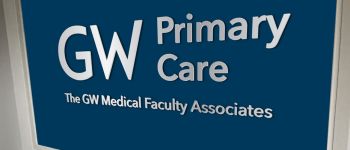Movement Disorders Program
Make a New Patient Appointment:
Call 202-741-2700

Services We Offer & Conditions We Treat:
- Parkinson’s Disease
- Progressive supranuclear palsy
- Lewy body dementia
- Corticobasal syndrome
- Multiple System Atrophy
- Tremors
- Dystonia
- Ataxias
- Tardive dyskinesia
- Chorea
- Restless leg syndrome
- Tics
- Functional Movement Disorders
- Medical evaluation
- Surgical evaluation
- Botulinum toxin treatment
- Rehabilitation
A committed, focused team of highly trained specialists in The Parkinson’s Disease and Movement Disorders Program cares for patients with Parkinson’s disease, tremors, dystonia, ataxia, chorea, restless leg syndrome, and tics, as well as functional and unusual movement disorders.
Working with dedication and diligence to deliver exceptional patient care, we integrate best practices, evidence-based medicine, and multi-disciplinary collaboration. We offer a variety of treatment options for individuals with Parkinson’s disease and movement disorders. We recognize that complex movement disorders can also cause non-movement symptoms. Our goal is to provide comprehensive care. Our board-certified neurologists are on the forefront of advances in their fields through continuing education by teaching at The George Washington University School of Medicine & Health Sciences and through biomedical research.
Neurology at The GW Medical Faculty Associates
As a division of The GW Medical Faculty Associates (MFA) Department of Neurology, we work closely with our respected colleagues in the Department of Neurosurgery to offer comprehensive functional neurosurgical treatment. Our deep brain stimulation (DBS) program, run by a specialty-trained neurosurgeon and neurologist team, includes pre-operative planning, intra-operative monitoring, and long-term programming for patients with advanced Parkinson’s disease, tremors, and other diagnoses.
Collaborative Care
Your neurologist and neurosurgeon will work collaboratively to discuss if, when, and what type of surgery is best. If surgery is indicated, we are privileged to have at hand all the resources of The George Washington University Hospital and its Neurosciences Institute, one of the world’s premier neurological centers.
For a variety of disorders, including tremors, writer’s cramp, cervical dystonia (spasmodic torticollis), blepharospasm (involuntary or prolonged blinking), and spasticity, we have extensive training and experience in Botulinum toxin treatment.
With backgrounds that include education and training at the Harvard Medical School’s Massachusetts General Hospital, the Mayo Clinic, and the National Institutes of Health (NIH), patients benefit from the expertise of accomplished specialists in Parkinson’s disease and movement disorders.
Our team includes active members of the Movement Disorders Society, the American Academy of Neurology, the American Neurological Association, the American Association of Neurological Surgeons, and the Congress of Neurological Surgeons. The physicians in our program lead and participate in clinical research that, for example, tests new medications for Parkinson's disease. They teach at The George Washington University School of Medicine & Health Sciences and are also committed to educating their patients to foster a collaborative doctor-patient relationship.
“Because we are an academic institute, we naturally have a strong dedication to educating our patients about their disease or condition, and all the treatment options. Knowledge is a key contributor to having the best possible quality of life while managing a challenging disease.”
Our Care Philosophy
“Patients that receive care for Parkinson’s disease and other neurologic movement disorders at The GW Medical Faculty Associates benefit from the skill, knowledge, and compassion of our specialists. You will always see a neurologist with advanced training in movement disorders during your evaluations, and be offered to participate in advanced clinical research. We offer our patients the full extent of the resources of the world-class Neurosciences Institute at The George Washington University Hospital.”
Dr. Mohamad Koubeissi, Chairman, Department of Neurology
Why Choose Us?
Knowing that concern and anxiety are uncomfortable for our patients, we are proud of our ability to be responsive and efficient. Our front office staff does everything possible to schedule appointments for both new and established patients within two weeks. Our patients receive their test results rapidly, thanks to our own pathologists and laboratories at our clinic locations in both Washington, DC and Montgomery County, MD. We routinely communicate with patients’ primary care physicians, who receive prompt reports after each visit.
Within our larger Medical Faculty Associates group, the Parkinson’s Disease and Movement Disorders Program has the intimacy of a private practice along with the expertise and collaborative spirit of an academic institution. It greatly benefits our patients that our program is comprised of a broad range of specialists, especially our highly trained functional neurosurgeons.
SUPERIOR CARE: Listen. Examine. Diagnose. Treat.
For Parkinson’s disease and most movement disorders, there is typically no diagnostic blood test or brain scan. Efficient and effective care is contingent upon expert clinical evaluation. Our MFA Parkinson’s Disease and Movement Disorders Program team of neurologists and neurosurgeons offer patients invaluable skills and judgment that have been developed over years of education, training, and experience.
If you think you may have Parkinson’s disease or any movement disorder, you want to have a thorough evaluation by a highly specialized neurologist with mastery of the various signs and symptoms of the entire spectrum of movement disorders. The physicians in The GW Medical Faculty Associates Parkinson’s Disease and Movement Disorders Program have the intellectual and educational prowess to identify a wide-ranging variety of conditions and develop strategies that have positive outcomes.


